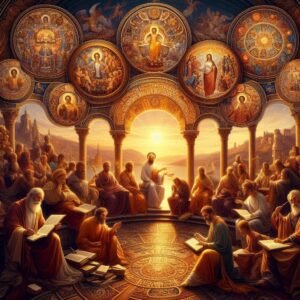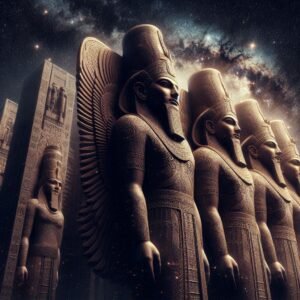The concept of free will plays a significant role in how divine communication is understood in many religious traditions. If a community or individual decides that God will not speak to them or they will not be open to further revelation, it’s often the case that God respects that decision, as it aligns with the notion that humans have free will in their relationship with the divine.
Religions often reinforce this idea, especially when there is an established orthodoxy or a defined canon. They may actively discourage further claims of prophecy or mystical experiences that fall outside of what is considered legitimate, and this can create a kind of spiritual boundary where anything outside of the recognized framework is viewed with suspicion or even hostility. Here’s how this unfolds in some cases:
Islam and the Persecution of New Prophecies
In Islam, the finality of prophethood with the Prophet Muhammad is a fundamental belief (the “Seal of the Prophets”), and any claim to be a new prophet after him is seen as heretical. Theologically, Islam holds that the message of Muhammad is complete and universally applicable. So, anyone who claims to have a new prophecy or revelation is often viewed as either deluded or as someone challenging the core tenets of the faith. Historically, this has led to persecution or exclusion, as it threatens the authority of the established religious order.
Catholicism and Mysticism
Similarly, in the Catholic Church, there is a historical tendency to regulate mystical experiences, visions, and prophecies. While the Church has recognized some mystics (like St. Teresa of Ávila or St. John of the Cross), it typically scrutinizes such experiences carefully to ensure they align with Church doctrine. If a mystic or prophet’s claims fall outside the accepted parameters, or if they conflict with the established interpretation of Scripture, the Church may dismiss, silence, or even persecute them. The idea here is that God’s message has been fully revealed through Scripture and tradition, and anything outside of that may be viewed with suspicion or even as a threat to the authority of the clergy and hierarchy.
Limiting the Divine Message
In both cases, these religious institutions set boundaries around what is considered legitimate communication from God. While these boundaries may be seen as preserving orthodoxy, they also inherently limit the scope of what God is allowed to communicate, or at least what is deemed acceptable to hear. In this context, the religious authority effectively channels God’s will in a controlled manner, which may result in the rejection of any “unapproved” divine communication, even if it is perceived as coming from a sincere source.
In this framework, if a person claims to have received a divine message that contradicts the accepted dogma, it is often not just a spiritual or theological matter, but also a social and political one. The religion may feel the need to protect the established order, and thus any new claim is not just about the content of the message but about maintaining the integrity of the religious system.
Spiritual Consequences of Closing Off to God
From a broader theological perspective, this kind of closure to divine communication—whether it’s through direct prophecy, mystical experience, or ongoing revelation—has consequences. It may create a community where spiritual growth is limited to what has already been established, and where the possibility of new revelations or divine insights is blocked. The community or individual effectively shuts themselves off from the dynamic, living relationship with the divine that could otherwise continue to unfold over time.
In essence, when a religion or community decides that God will no longer speak to them, this decision can lead to a spiritual stagnation, as new insights and understandings are viewed as disruptive. Yet, the underlying principle remains: God, in many traditions, respects human free will, and if people or institutions decide they no longer wish to hear or receive, the divine will often allow that decision to stand, albeit with potentially significant consequences for spiritual growth and understanding.








